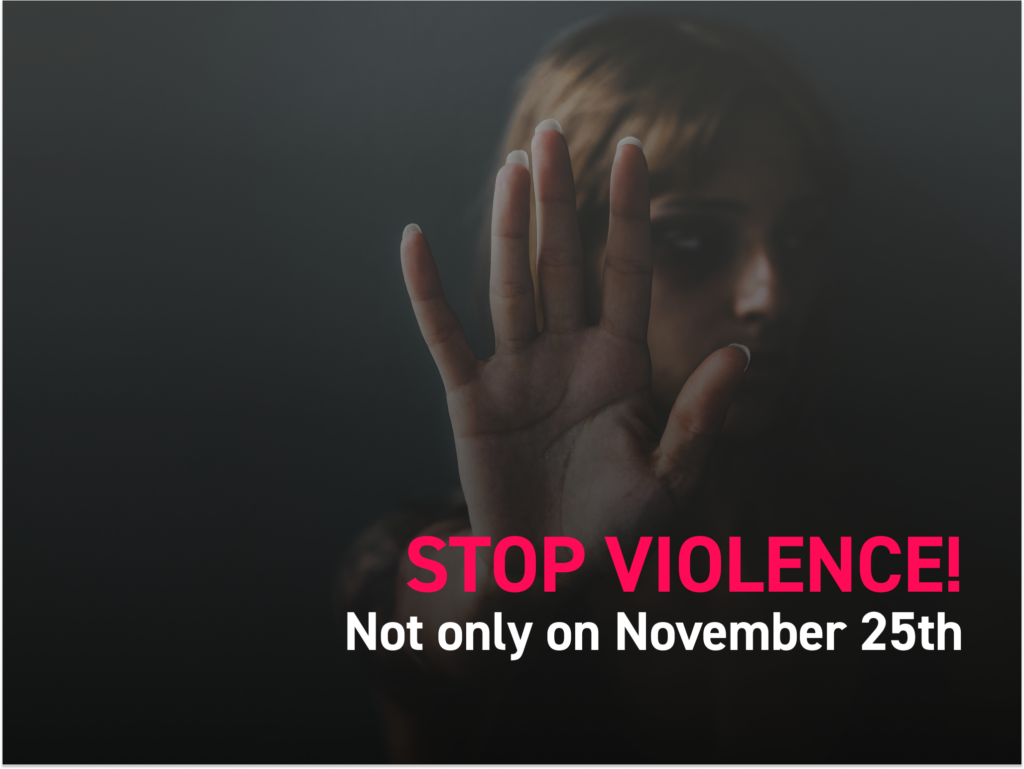
November 2021
Established in 1999 by the UN, November 25th is known as the Orange Day: orange because this color is recognised across the globe as the one symbolizing a future without violence against women.
This date was chosen in 1960 to commemorate the killing of the Mirable Sisters, political activists in the Dominican Republic. On 25th November 1960, in fact, the three women went to visit their husbands in prison and, on the road, they were stopped by military intelligence officers. They were massacred and thrown off a cliff in their car to make it seem an accident.
Women and girls everywhere continue to be subjected to multiple forms of gender-based violence, like domestic violence, online violence, and feminicide, when they speak out for the simple fact of being women and girls. This kind of violence is the result of intersectional forms of political, social, racial, cultural, and economic discrimination perpetrated daily against women and girls in all.
Particularly concerning, over the fact that women and girls continue to be subjected to multiple manifestations of violence, is that in the last years the spaces where this violence arises have multiplied. Nowhere is this more apparent than within online spaces, including social media. Governments, private companies, and others may seek to hide their responsibilities behind the nature of the internet, which seems to be borderless.
Violence against women and girls flourishes because those who seek to silence women and girls and facilitate their exploitation, abuse, maiming, and killing are not firmly prevented from and held accountable for their actions.
Women and girls around the world should not be silenced and they need to be heard. And women’s rights are human rights.
States should ensure and create an enabling environment for women to exercise their freedoms of expression, assembly, association, and public participation free from intimidation and attacks. States must protect women human rights defenders, activists, and women’s organisations who are regularly harassed, intimidated, and subjected to violence for defending their rights and promoting equality. The level and frequency of violence against them should raise alarm bells everywhere. It is, and should be, a public policy and a human rights priority.
If we want to estimate the underlying health, prosperity of a society, and security, we all need to address our duty to play a part in the respect and furtherance of women and girls’ rights. This is because there will be no prosperity without ending violence against women and girls in the public as well as in the private sphere.
Regarding gender diversity, JEE pays particular attention to the promotion of initiatives to attract talents at an international level, and to the development of managerial and professional skills to empower women and girls. Empowering women means that women can have more control over their lives. This means giving them the freedom to make their own programmes, gain new skills, and gain autonomy. Women empowerment is created when the strengths that women bring to the workplace are accepted and used.
It is concerning that globally, women occupy only 27.1 percent of managerial positions, a proportion that has not changed significantly in nearly three decades.
Only 25.1 percent of managers with children under 6 years of age are women, whereas the figure for women without young children is 31.4 percent. However, where men share unpaid care work more equally with women, more women are found in managerial positions.
The highest levels of leadership remain resistant to gender diversity. Women accounted for less than 4 percent of board chairs across nearly 7,000 companies in 44 countries and globally only 15 percent of board seats are held by women.
In G7 countries, the average proportion of women on the boards of the largest publicly listed companies is 27.04 percent. France, Germany, and Italy are the countries where women are best represented on company boards. These are also the only G7 countries that have established a quota system for women’s representation on company boards. In any case, empowering women also means giving them the opportunity to thrive as investors and entrepreneurs.
Yet as we can see in the data above, women managers and entrepreneurs remain a small minority.
We, as the new generation should commit to gender equality, driving change and action that fosters diversity and inclusion across all levels, and thus contribute to transforming business culture more generally.
Some strategies for empowering women to enter and remain in business and management roles may include adopting a continuous improvement approach, promoting women, and closing the gender gap, diversifying the executive pipeline, and demonstrating commitment and action on the part of leadership. To truly succeed in gender equality, organisations need to commit and engage in actions that ensure that women are represented and equally valued in all positions, both leadership and on boards. This kind of high-level commitment fosters a gender-inclusive enterprise culture and sets the path for policies to enact change.
Leadership in organisations should frequently revisit policies and practices to identify possible areas for improvement. Identifying and addressing areas for further progress, and addressing any structural barriers, can help the organisations to fully realize gender equality across the entire organisation.
And when we empower our women for good, we are not empowering just the individual now, but also the generations to come.
Written by Andrea Coletti,
Network Diversity & Inclusion Manager at JEE
If you have more questions or just want to talk with us, please send us an email at publicaffairs@juniorenterprises.eu.